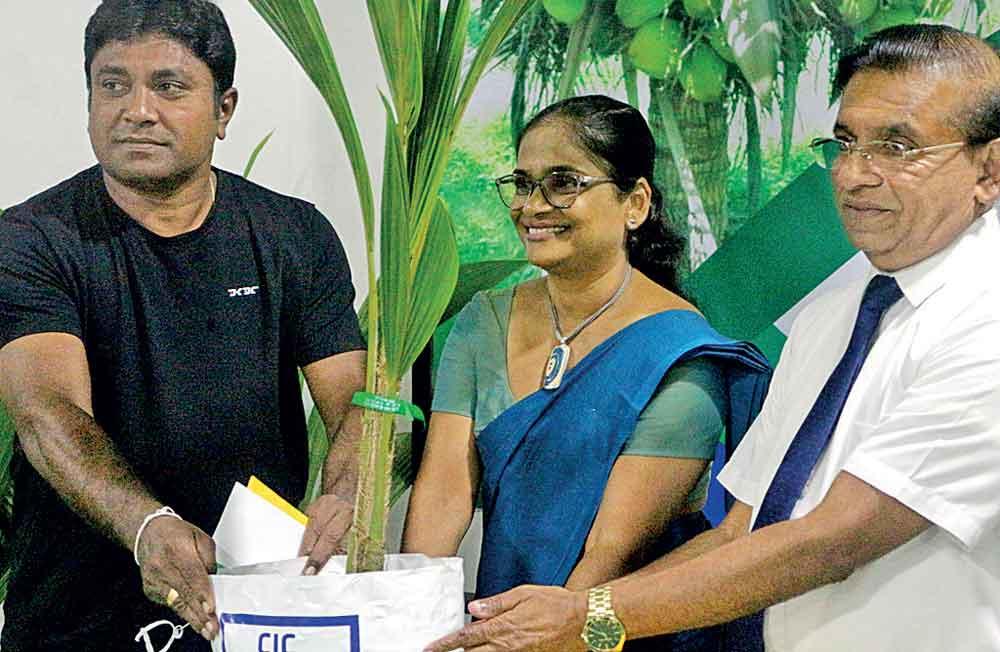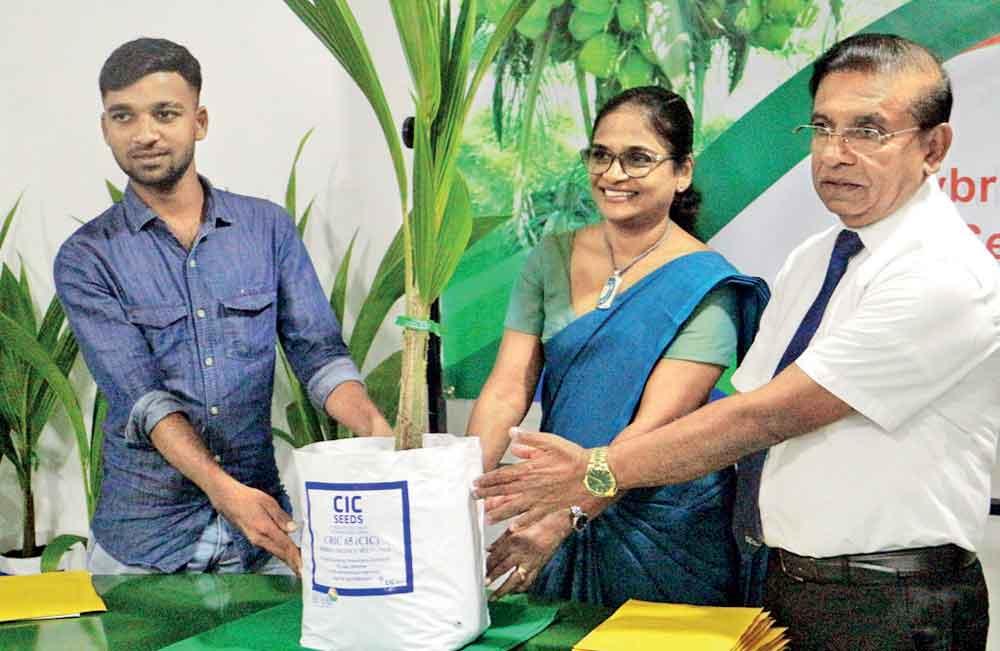Reply To:
Name - Reply Comment

The first consignment of hybrid coconut saplings presentation
By K.G.Karunaratne
|
Mr Waruna Madawanaarachchi MD CIC Agribusinessses |
|
Director CRI Dr Nayanie Arachchige
|
Coconut is one of the main consumer goods of which the increasing price has been a major issue in our country. Much has been talked and written about the crisis facing coconut cultivation in Sri Lanka and the increasing prices of coconut. It is common opinion that coconut estates have been increasingly used for residential purposes and felling of coconut trees for timber have been going on unchecked and these resulted in the exorbitant price of coconut.
Coconut smallholders have neglected maintenance of coconut cultivation due to the skyrocketed prices of fertilizer and the high cost of labour and it has resulted in the poor yield.
Meanwhile the Coconut Cultivation Board and the Coconut Research Institute are of opinion that the current production of coconut was sufficient to meet the country’s requirement of coconut for consumption. However, it is in question why the price of coconut has been increasing in leaps and bounds everyday.
Coconut cultivators have pointed out that the shortage of high quality coconut saplings have affected coconut re-planting since it is an integral part of well-maintained coconut plantations to remove the unproductive old trees and to replace them with new cultivation.
Hybrid Coconuts in the Making
With this in view the Coconut Research Institute, in collaboration with the CIC, a leading private sector company , has launched a project to produce hybrid variety of coconut saplings. A senior official of the Coconut Research Institute said the project has been a complete success.

Felling of cocount trees is one casual factor
The first consignment of hybrid coconut saplings CRIC 65 that bears in a very short time of about three years was introduced recently at Pelvehera CIC Farm in Dambulla with Chairperson of the Coconut Cultivation Board Saman Devage as the Chief Guest and with the distinguished participation of Director, Coconut Research Institute Dr. Nayani Arahchige, Deputy Director (Research) Dr. Sarath Edirisinge, Residential Manager, Huruluwewa Mahawerli Zone, Ubhaya Kalyana Kumaa , Dambulla Divisional Secretary Piyal Jayasuriya, CIC Agricultural Business Managing Director Waruna Madawanaarachchi, Deputy Managing Director Anjana Leelaratne and CIC Agro Business General Manager Chamila Senanayake.
Addressing the ceremony the Director of Coconut Research Institute Dr, Nayani Arachchige said the countries requirement of hybrid coconut saplings was between 3-4 million per year and a state and private sector joint project has been launched to resolve this issue.“ I am hopeful that the requirement of coconut saplings could be met through this project. As we already know, coconut is a major cash crop, while being an essential consumer good, just as paddy cultivation. More than 70 percent of the yield is used for local consumption while the export of coconut products based on other 30 percent brings to the country an income of US$ 0.8 million. Today we talk of that major cash crop bringing foreign exchange to the country. The average yield is about 3000 million coconuts per year. We have been conducting research since 1960 to boost the production. With this in view, have taken several steps to uplift the quality of coconut samplings and the nutrients. The endeavor to develop hybrid coconut saplings is one of these. Our research had established that we can expect a yield of about 150 nuts per tree at a time from the new variation introduced by us.
Joint Project with Private Sector
At present, we are in a position to develop about 200,000 saplings at the Research Institute although the requirement per year is between 3 to 4 million. Coconut Research Institute in 2021 took a policy decision to resolve this issue with the concerted effort of several institutions including the private sector. Now the Coconut Cultivation Board, Kurunegala Plantation Company and the Chilaw Plantation Company have undertaken to develop the new variety. I am pleased to find that the CIC have accepted our invitations to join hands with us in this arduous task. We have been able to achieve our target to introduce a new hybrid variety”.
Business Managing Director of CIC Waruna Madawanaarachchi said the CIC has made a forward stride as a company providing consultancy in agricultural research to resolve the issues affecting paddy cultivation and several other crops min Sri Lanka.

“ The President, has focused particular attention on giving a new impetus to the productivity of coconut cultivation. We talked about it and considered how our company could be part and parcel to this effort. We are pleased to have the opportunity to join this project. The yield from 400,000 hectares including home gardens is not satisfactory. New varieties should be introduced to increase the production as in the case of Kerala state. I highly appreciate the step taken by the Coconut Research Institute.” He said.
Hybrid
|